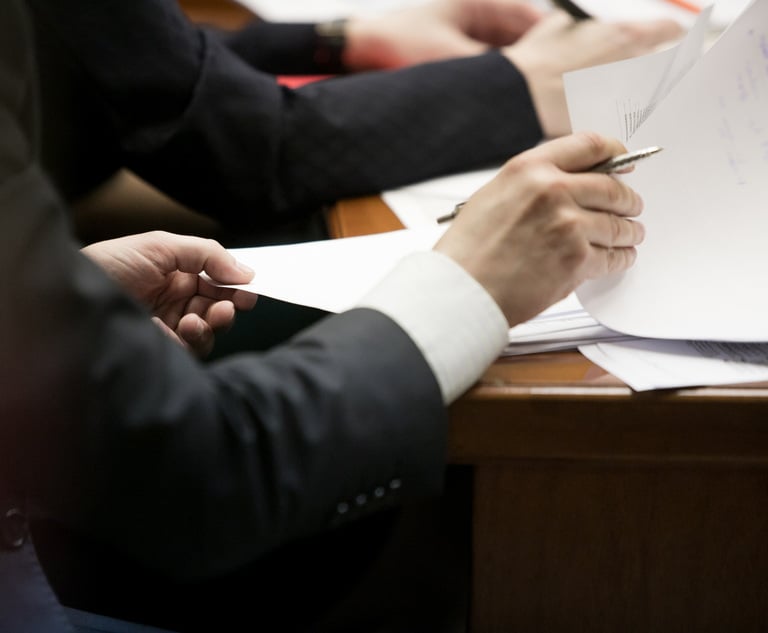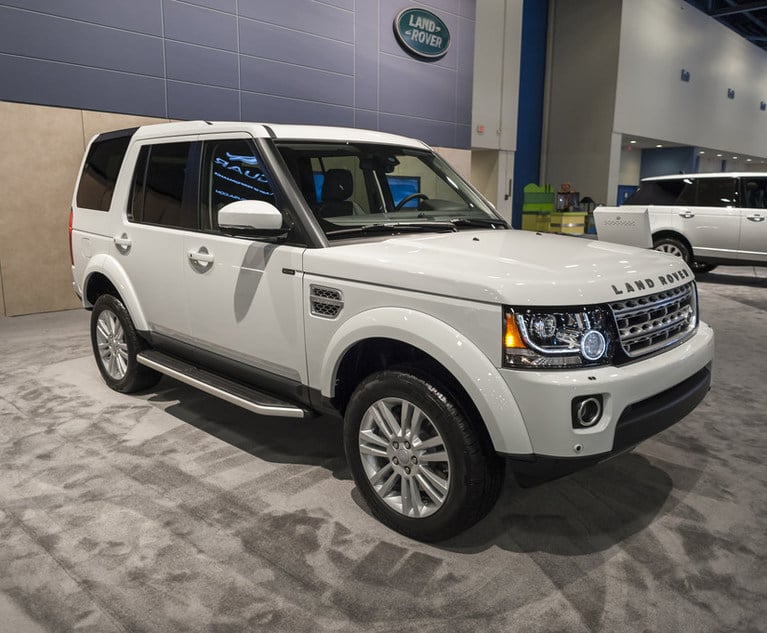Amazon's Recall of Solar Eclipse Glasses Was 'Tragically Too Little, Too Late': Lawsuit
As millions of Americans prepared to witness a total solar eclipse, Amazon.com Inc. sent a safety warning to consumers who'd purchased potentially hazardous safety glasses and camera filters to capture the spectacle in the sky.
September 01, 2017 at 06:40 PM
4 minute read
As millions of Americans prepared to witness a total solar eclipse, Amazon.com Inc. sent a safety warning to consumers who'd purchased potentially hazardous safety glasses and camera filters to capture the spectacle in the sky.
“We recommend that you DO NOT use this product to view the sun or the eclipse,” Amazon wrote in emails to consumers, according to published reports.
Amazon is now the target of a class action in Charleston, South Carolina, federal district court, where five law firms teamed up to sue the online retail giant over its alleged inadequate recall notification before the Aug. 21 eclipse. In the lawsuit, lawyers argue Amazon's recall effort was “tragically too little, too late” and claim that the lead plaintiffs—Corey Payne and his fiancé, Kayla Harris—did not receive the email notice.
“Notwithstanding Amazon's woefully inadequate email notification, any and all users of eclipse glasses were subjected to unreasonable and foreseeable risks of severe and permanent eye injury due to the negligence of Amazon,” the complaint said.
The lawsuit notes that eclipse glasses were often sold in packs of three and 20 and then “distributed to individuals, who never received a warning email.”
After viewing the eclipse, Payne and Harris claim they began experiencing “pain and discomfort, headaches, eye watering and other symptoms,” according to the lawsuit. The two also “began to see dark spots in their line of vision, suffered vision impairment, including blurriness, a central blind spot, increased sensitivity, changes in perception of color and distorted vision,” according to the lawsuit.
A lawyer for the plaintiffs, James Ward Jr. of McGowan, Hood & Felder in Mount Pleasant, South Carolina, did not immediately respond to a request for comment Thursday.
The complaint, filed in the U.S. District Court for the District of South Carolina, raises questions about how companies should respond when they learn about or are made aware of a potential product-safety problem.
Amazon, which reportedly did not manufacture the glasses in question, declined to comment on whether it had contacted any government agency as part of its recall. It's unclear which agency, if any, would have been a part of such a recall.
A spokeswoman for the U.S. Consumer Product Safety Commission, which conducts recalls with companies and penalizes those manufacturers that fail to immediately report potential hazards, said the eclipse glasses fall under the jurisdiction of the U.S. Food and Drug Administration. A spokeswoman for the FDA—which oversees recalls of medical devices such as sunglasses—said the agency has not “cleared or approved any product for this purpose nor issued guidance on solar eclipse glasses.”
The FDA spokeswoman noted in an email that the International Organization for Standardization has recommended specifications for eclipse glasses.
In the buildup to the total eclipse, NASA and the American Astronomical Society urged viewers to only use glasses engineered by reputable vendors and carrying the international safety standard number “ISO 12312-2.”
Amazon, in its alert to consumers, said it was unable to confirm that some of the protective shades sold on its site were made by reputable manufacturers. The company reached that conclusion after reviewing suppliers “out of an abundance of caution,” an Amazon spokesperson told PBS, for a story that was cited in the lawsuit filed this week.
But Amazon has not publicly disclosed the list of vendors it found unreliable.
C. Ryan Barber, based in Washington, covers government affairs and regulatory compliance. Contact him at [email protected]. On Twitter: @cryanbarber.
This content has been archived. It is available through our partners, LexisNexis® and Bloomberg Law.
To view this content, please continue to their sites.
Not a Lexis Subscriber?
Subscribe Now
Not a Bloomberg Law Subscriber?
Subscribe Now
NOT FOR REPRINT
© 2024 ALM Global, LLC, All Rights Reserved. Request academic re-use from www.copyright.com. All other uses, submit a request to [email protected]. For more information visit Asset & Logo Licensing.
You Might Like
View All
Judge: Only One Plaintiff for Upcoming Bellwether Trial Over J&J Talc
5 minute read
Class-Action Suit Filed Against Jaguar for Claims of Defective Windshields in Land Rover Defender

Are Beach Umbrellas Too Dangerous? The Consumer Protection Safety Commission Weighs In
8 minute read
Trending Stories
- 1Infant Formula Judge Sanctions Kirkland's Jim Hurst: 'Overtly Crossed the Lines'
- 2Preparing Your Law Firm for 2025: Smart Ways to Embrace AI & Other Technologies
- 3Abbott, Mead Johnson Win Defense Verdict Over Preemie Infant Formula
- 4Greenberg Traurig Initiates String of Suits Following JPMorgan Chase's 'Infinite Money Glitch'
- 5It's Time Law Firms Were Upfront About Who Their Salaried Partners Are
Who Got The Work
Michael G. Bongiorno, Andrew Scott Dulberg and Elizabeth E. Driscoll from Wilmer Cutler Pickering Hale and Dorr have stepped in to represent Symbotic Inc., an A.I.-enabled technology platform that focuses on increasing supply chain efficiency, and other defendants in a pending shareholder derivative lawsuit. The case, filed Oct. 2 in Massachusetts District Court by the Brown Law Firm on behalf of Stephen Austen, accuses certain officers and directors of misleading investors in regard to Symbotic's potential for margin growth by failing to disclose that the company was not equipped to timely deploy its systems or manage expenses through project delays. The case, assigned to U.S. District Judge Nathaniel M. Gorton, is 1:24-cv-12522, Austen v. Cohen et al.
Who Got The Work
Edmund Polubinski and Marie Killmond of Davis Polk & Wardwell have entered appearances for data platform software development company MongoDB and other defendants in a pending shareholder derivative lawsuit. The action, filed Oct. 7 in New York Southern District Court by the Brown Law Firm, accuses the company's directors and/or officers of falsely expressing confidence in the company’s restructuring of its sales incentive plan and downplaying the severity of decreases in its upfront commitments. The case is 1:24-cv-07594, Roy v. Ittycheria et al.
Who Got The Work
Amy O. Bruchs and Kurt F. Ellison of Michael Best & Friedrich have entered appearances for Epic Systems Corp. in a pending employment discrimination lawsuit. The suit was filed Sept. 7 in Wisconsin Western District Court by Levine Eisberner LLC and Siri & Glimstad on behalf of a project manager who claims that he was wrongfully terminated after applying for a religious exemption to the defendant's COVID-19 vaccine mandate. The case, assigned to U.S. Magistrate Judge Anita Marie Boor, is 3:24-cv-00630, Secker, Nathan v. Epic Systems Corporation.
Who Got The Work
David X. Sullivan, Thomas J. Finn and Gregory A. Hall from McCarter & English have entered appearances for Sunrun Installation Services in a pending civil rights lawsuit. The complaint was filed Sept. 4 in Connecticut District Court by attorney Robert M. Berke on behalf of former employee George Edward Steins, who was arrested and charged with employing an unregistered home improvement salesperson. The complaint alleges that had Sunrun informed the Connecticut Department of Consumer Protection that the plaintiff's employment had ended in 2017 and that he no longer held Sunrun's home improvement contractor license, he would not have been hit with charges, which were dismissed in May 2024. The case, assigned to U.S. District Judge Jeffrey A. Meyer, is 3:24-cv-01423, Steins v. Sunrun, Inc. et al.
Who Got The Work
Greenberg Traurig shareholder Joshua L. Raskin has entered an appearance for boohoo.com UK Ltd. in a pending patent infringement lawsuit. The suit, filed Sept. 3 in Texas Eastern District Court by Rozier Hardt McDonough on behalf of Alto Dynamics, asserts five patents related to an online shopping platform. The case, assigned to U.S. District Judge Rodney Gilstrap, is 2:24-cv-00719, Alto Dynamics, LLC v. boohoo.com UK Limited.
Featured Firms
Law Offices of Gary Martin Hays & Associates, P.C.
(470) 294-1674
Law Offices of Mark E. Salomone
(857) 444-6468
Smith & Hassler
(713) 739-1250






